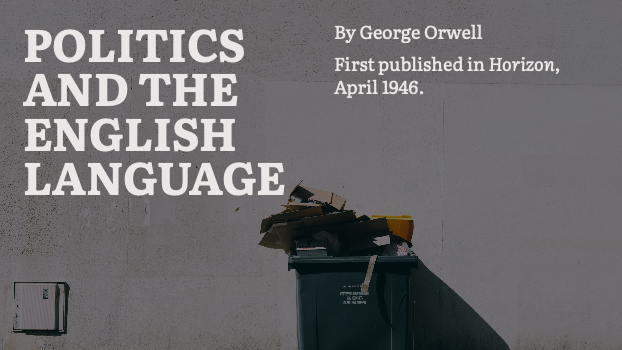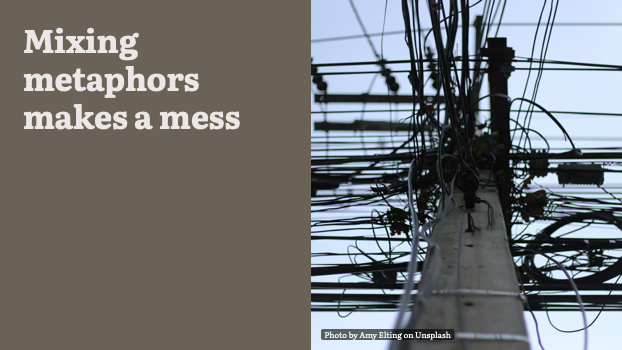Politics and the english language
By George Orwell
First published in Horizon, April 1946.
Is the English language declining?
Many people believe the English language is deteriorating, but assume nothing can be done to fix it. Its decline is often seen as somehow natural, an inevitable process tied to societal decay.


Political and economic causes
But language decline stems from political and economic causes, not just poor writing. The decline creates a vicious cycle: bad language leads to bad thinking, and vice versa.
Political writing is often lifeless and imitative, reflecting party lines rather than original thought. It relies on familiar, overused phrases that lack vividness or clarity.
But who cares about bad writing habits? You should.
Bad writing habits spread by imitation and hinder clear thinking. Even well-meaning writers use clichés and pretentious phrases. Avoiding these habits is crucial for both personal and societal improvement.


Can we reverse the decline? Yes!
We can reverse the decline of English by breaking bad habits. Clear thinking enabled by better language is essential for political regeneration.
Let dying metaphors... die
Overused metaphors lose their vividness. We use them out of habit. For example, "toe the line" and "Achilles’ heel" are overused, outdated and often misunderstood.


Making simple things complex
Sometimes we use complex phrases to replace simple verbs, making our writing bloated and vague. For example, "render inoperative" and "exhibit a tendency to."
Big words = small brain? Pretentious writing
We also often use fancy Latinized language to sound authoritative or elegant. It may look clever, but that kind of style obscures our meaning and makes our writing less accessible. For example: "epoch-making," "virtual," and "cul de sac."


Abusing political language
Political words like "democracy" and "fascism" are often used dishonestly as their meanings are stretched to fit various agendas.
Modern writing at its worst
Modern writing often relies on pre-packaged phrases rather than clear, original expression. This approach is easy — but by doing so we sacrifice precision and clarity in what we say.


Dangerous shortcuts
Think about all the ready-made phrases we use to save effort and create a false sense of sophistication. We’re all guilty of doing it.
Mixing metaphors makes a mess
Similarly, mixed metaphors reveal a lack of clear thought and mental imagery. By saying things like "The Fascist octopus has sung its swan song, the jackboot is thrown into the melting pot" merely demonstrates our own confusion and lack of creativity.


Defending the indefensible
Euphemisms and vague language allow politicians to avoid confronting uncomfortable truths, like justifying atrocities or controversial actions. Terms like "pacification" and "transfer of population" obscure the harsh realities behind them.
How do we fix it?
Defending English isn’t about archaic language, grammar rules, or avoiding Americanisms. It’s about scrapping useless words and idioms, and prioritizing clarity over style.
Think before you write. Think while you write.


Fight for better writing!
Improving our writing isn’t pointless. It’s essential for clear thought and political progress. Everyone, not just writers, must take responsibility for combating poor language habits.
How to write clearly
Use short words. Cut unnecessary words. Use active voice over passive where possible. Avoid foreign phrases, jargon, and overused metaphors unless absolutely necessary.

Conclusion: Resist the decay
Simplifying English frees us from useless orthodoxy and exposes bad writing. Clear language makes it harder to disguise lies or poor reasoning.
To improve language we need to reject worn-out phrases and embrace clarity.
By changing individual habits, we can resist the decay of language and thought.
















